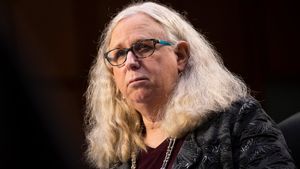When Grace Helen Whitener left Trinidad for the United States at the age of 16 to seek medical care, she probably didn't realize she'd end of being a part of American history. But when Washington's Democrat governor Jay Inslee recently appointed her to the state's Supreme Court, that's exactly what she did.
The addition of Whitener -- as well as Inslee's recent appointment of Raquel Montoya-Lewis, the first Native American justice to serve -- now makes the predominantly female and racially-varied court the most diverse in U.S. history. The sundry court also includes Chief Justice Debra Stephens and Justices Barbara Madsen, Charles Johnson, Susan Owens, Steven Gonzalez, Sheryl Gordon McCloud, and Mary Yu.
"I think my background is so diverse and so varied that I represent just about every type of individual that could possibly come before the court," Whitener said in Washington's Daily Record News upon her appointment to the bench. "As far as equity and inclusion, it does not matter where you are, or who you're dealing with. What we are to be concerned about is the impact our actions have on others and that has always been my focus and I hope I can continue doing that."
After arriving in the U.S. Whitener went on to earn degrees from Baruch College in New York and the Seattle University School of Law and worked as prosecutor, public defender, and private defense attorney. Before being appointed to Washington's Supreme Court, she previously made history as the state's first Black LGBTQ+ judge.
The first Black person appointed to the state's Supreme Court was Charles Z. Smith, who served from 1988 until his retirement in 2002. In September of last year, the Washington State Bar Association awarded Whitener with the prestigious Justice Charles Z. Smith Excellence in Diversity Award.

Justice Whitener receiving the Justice Charles Z. Smith Excellence in Diversity Award in 2019.
Whitener, 55, has been an outspoken advocate for marginalized communities and judicial diversity throughout her career, and is a co-chair of the Washington State Minority and Justice Commission.
"I believe as a marginalized individual -- being a Black, gay, female, immigrant, disabled judge -- that my perspective is a little different," she said shortly before her nomination to the Supreme Court, according to PinkNews.
"Having a judiciary that is reflective of the community that it serves is truly important in raising trust and confidence in the services that we provide as judicial officers," Whitener added.
RELATED | This Lesbian Judge Was Forced to Remove Her Pride Flag from Court








































































